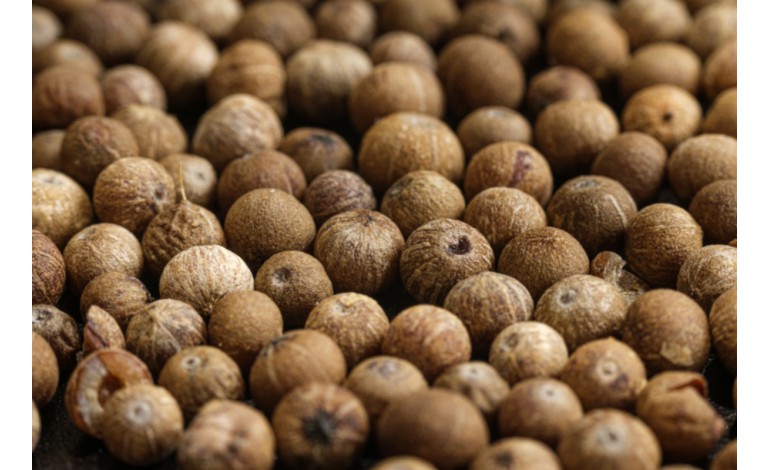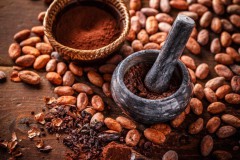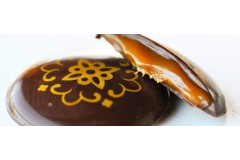Let's take a closer, scientific look: “Any body immersed in a fluid at rest, completely wetted by it or passing through its free surface, is subjected to a vertical force, directed from bottom to top and opposed to the weight of the volume of fluid displaced” You'll have recognized Archimedes' thrust, of course. It's a verified scientific theory that measures a body's buoyancy.
The calculation is based on the weight and volume of the object, and therefore on its density. We'll refer here to the density of pepper, not the apparent density used in the pepper trade. Bulk density calculates the density of a volume of peppercorns in a container. It does not define the density of a single peppercorn, as it takes into account the volume of air between each peppercorn (it is used in the pepper trade, and varies in density from 400 to 600 g/l).
According to the report Physico-mechanical properties of black pepper (Piper nigrum L.)S Balasubramanian*, R Kumar1, K K Singh2, T John Zachariah3 & Vikram,Central Institute of Agricultural Engineering, India, the intrinsic density of peppercorns varies between 0.987 and 1.012. The variation is due to the pepper's moisture content. In general, commercially available peppers have a moisture content of around 10-12%, giving them a density greater than 1.
This explains why your peppercorns sink when immersed in water.
But the famous test tells us that if any grains are on the surface, it's synonymous with poor quality. Let's take a closer look at the phenomenon. There are two related explanations:
- Some grains have a density of less than 1, and therefore naturally remain on the surface.
- There's also the phenomenon of water surface tension.
A new scientific fact needs to be introduced: the surface tension of water. (https://fr.wikipedia.org/wiki/Tension_superficielle) This is simply what makes gerrids walk on water. You're probably familiar with these insects, which we've seen walking on ponds and streams in our childhood.
A simple exercise to verify this: if you put your peppercorns in a glass, delicately placed with tweezers, you'll notice that all the peppercorns float! A little downward force is enough to make them sink.
You need to exclude the surface tension of the water, taking care to push each peppercorn to the bottom of the glass. Most of the time, floating peppercorns were subject to this phenomenon, and all your peppercorns are at the bottom of the glass of water now. Those few stubborn floating peppercorns in no way meant that your pepper was of poor quality.
However, what if there are still a few stubborn peppercorns floating around? Should we conclude that the pepper is of poor quality? That its essential oil content is low?
In any case, we can conclude that their density is less than 1. Peppercorns with a density of less than 1 don't sink: buoyancy keeps them at the surface. Their density is less than 1 because they simply have a lower percentage of humidity than those at the bottom of the glass.
According to the study by T John Zachariah3 , at worst, we have grains with a density of 0.987.
According to CODEX CXS326-2017 STANDARD FOR BLACK, WHITE, GREEN PEPPER (NBV PEPPER), the essential oil percentage is around 1.5 to 2ml per 100g of whole pepper. Let's model our peppercorn on a 5mm sphere. So with the volume of the peppercorn and a density of 0.987, our peppercorn has a variation of 3% by weight (compared to a peppercorn with a density of 1.012). This weight variation is 0.015 g. According to the essential oil concentration of 2ml per 100g, we have a variation of 0.0003 ml of essential oil. According to Jacqueline Pham's 2007 Piper Nigrum L thesis, the density of pepper essential oil is between 0.87 and 0.89. So we have a variation in essential oil weight of 0.000261grams! This tiny variation would be enough to affirm that a pepper is of poor quality. In short, it's not serious.
No, you can't test a pepper by dipping it in water; it's simply quackery. This test is not backed up by any scientific argument; it attempts to make a crude link between essential oil concentration, density, density and therefore, in conclusion, the quality of the pepper.
Max Daumin
Max Daumin spices
Gold 2017-2018 Silver 2020 - 2021 Bronze 2019 | Trophée national de l'épicerie fine
Artisan Producer of the Collège Culinaire de France 2021
Peppercorns dipped in water to check its quality?
Posted by
Max Daumin
11/17/2021
Articles by Max Daumin



